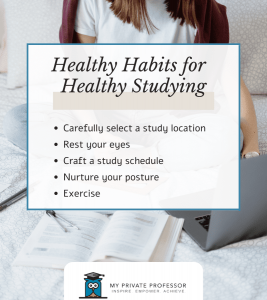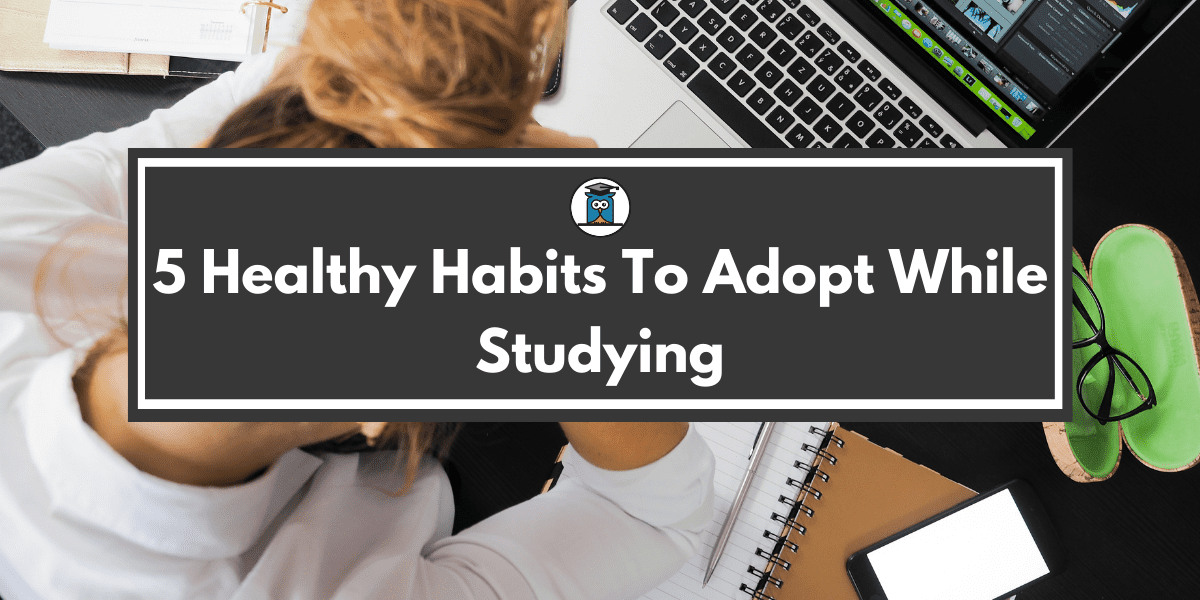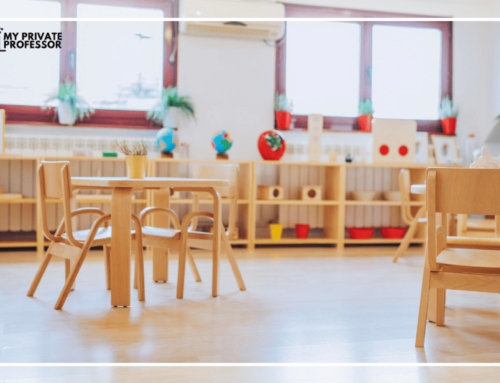When you are countless hours into studying, it’s important to stay mindful of your health. Extended periods of screen time, sitting for hours, and focusing on just one thing can be more damaging than you may realize.
As you approach your next big test, try to take a step back and fully evaluate your study process. Taking in the big picture will allow you to visualize which areas of your health you’re neglecting.
Addressing your studying habits will not only allow you to feel your best, but it will help you ace future tests. 
It’s no secret that we all have busy lives. Whether you are entering school as a freshman, or preparing to leave as a senior, life can get chaotic before you know it.
In addition to your busy schedule, you may have some a job on the side to help you survive financially. With such a busy schedule, it’s crucial that you’re getting the most out of your study sessions—even when under time constraints.
1. Choose a Study Location Carefully
For starters, a positive study environment is one of the most important factors for maximizing productivity. If you can’t seem to focus with background noise, don’t spend your time studying in a crowded coffee shop. Inconvenient and/or disruptive study environments can and may lead you to waste your precious study time.
Instead, settling in a quiet space like your dorm, a library, or even a quiet park can be great options (for those bothered by noise).
If you just can’t find a quiet work space, you may want to look into a coworker space. This is a modern take on the everyday office. These flexible spaces allow you to book a room to use for a certain time. If you work better with others, you can book a space with a friend.
While it may seem impossible to find a space where you can completely submerge yourself in your studies, there are options. And taking this extra step in finding your optimal study space can be the difference between a passing and failing grade on that physics test.
2. Give Your Eyes a Rest While Studying
Have you ever found yourself in a situation where you’ve been studying for hours and just can’t focus? Your eyes seem to be getting dry, even though you’re in your ideal studying environment. You keep trying to get back on track, but continue to zone out.
This may be a tell-tale sign that you need to take a break and come back. Long periods of screen time will not only dry out your eyes, but add tension and stress to the parts of your eyes that help with focus (cornea and lens).
 Whether you set aside five minutes or an hour, a break is a crucial tool—and can be a game changer. Taking a moment to step away and adjust your focus elsewhere can help you enhance your creativity and reduce stress from studying. Getting up and moving around does wonders for your body and mind—just make sure to come back and finish your work when you’re done!
Whether you set aside five minutes or an hour, a break is a crucial tool—and can be a game changer. Taking a moment to step away and adjust your focus elsewhere can help you enhance your creativity and reduce stress from studying. Getting up and moving around does wonders for your body and mind—just make sure to come back and finish your work when you’re done!
If you can’t afford a break, you may want to consider using other methods to help your eyes. Blue light glasses have become a common go-to for anyone struggling with too much screen time.
These glasses will allow your eyes to perform optimally throughout your long study session, without that pesky blue light drying out your eyes. If your schedule is jam-packed & you only have minimal time to study, this is a great alternative to a break.
Or, if you’re planning to spend a ton of time studying, blue light glasses will still mitigate some of those uncomfortable symptoms related to looking at a screen for extended periods (headaches, blurry vision, eye tension).
3. Create A Studying Schedule
Yes, creating a schedule to map out your study sessions does take some time. But it also allows you to know exactly when you have that free time to study. Organizing your schedule and setting time aside throughout your week can optimize your workflow while reducing the stress of an already busy week.
The conversation will no longer be “will I have time to study this week?” and will turn into “I have X amount of time each day reserved for studying.” To get started, we suggest you plan at the beginning of the week, or if you are given a longer assignment, start planning ASAP. Additionally, creating this schedule on something that you cary around often will help you make checking the schedule into a habit.
A daily planner is great if you’re a more traditional note-taker. For the more tech-savvy studier, the notes section on your phone may do the trick. Setting up your schedule this way gives you a clear timeline of when you need to prioritize your time— and allows you to prevent cramming at the last minute.
4. Watch Your Posture
It’s easy to quite literally find yourself in a slump while studying, especially during longer sessions. While it may seem unnoticeable since you’re comfortable in the moment, poor posture can hinder your studying.
It does so by putting extra stress and pressure on your neck and back. When you eliminate this tension by positioning yourself in the correct posture, you’re setting yourself up for more productivity and success.
The correct posture looks like sitting straight up with your head back above your shoulders, and your back directly touching your chair. While it may seem difficult at first, over time, your body will acclimate, and then thank your posture—and so will your grades.
5. Exercise
We’ve all heard that exercising is key for a generally healthier life but, what about for studying? It has benefits here, too. When you get your body moving, your brain releases endorphins and proteins that help improve your motivation, focus, and productivity.
In a study, researchers found that exercise not only optimizes your cognitive skills, but improves your memory. And these are two major skills that are crucial for quality study sessions.
If you’re participating in a longer study session, take a break mid-way to get your body up and moving. Coming back feeling refreshed will not only help you optimize productivity, but you might also remember more.
If you don’t have a long time to study, simply try to exercise 30 to 60 minutes beforehand. Bottom line: exercising is a great way to level up multiple areas of your life, and studying happens to be one of them—in turn, you’ll perform better in the classroom.
Happy studying!







